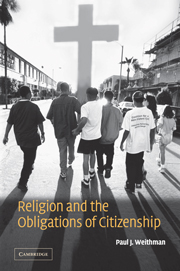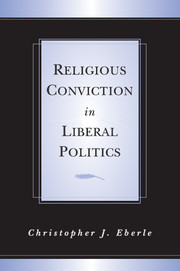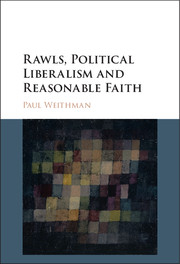Religion and the Obligations of Citizenship
In Religion and the Obligations of Citizenship Paul J. Weithman asks whether citizens in a liberal democracy may base their votes and their public political arguments on their religious beliefs. Drawing on empirical studies of how religion actually functions in politics, he challenges the standard view that citizens who rely on religious reasons must be prepared to make good their arguments by appealing to reasons that are 'accessible' to others. He contends that churches contribute to democracy by enriching political debate and by facilitating political participation, especially among the poor and minorities, and as a consequence, citizens acquire religiously based political views and diverse views of their own citizenship. He concludes that the philosophical view which most defensibly accommodates this diversity is one that allows ordinary citizens to draw on the views their churches have formed when voting and offering public arguments for their political positions.
- Contributes to a major and continuing debate among political philosophers
- Draws on empirical social scientific findings
- Clearly written
Reviews & endorsements
"With Religion and the Obligations of Citizenship, Paul Weithman makes an important contribution to democratic theory. Written with philosophical precision and rigor but also informed by empirical work in the social sciences, this wide-ranging book argues that religious groups in America make valuable contributions to democracy by helping their members develop political skills. On this basis Weithman then criticizes the dominant tradition in liberal political philosophy that holds that religious citizens should seldom bring their religious views into the public square. Weithman puts the pro-religion argument in its best light. Thus, while his arguments will inspire controversy, they undoubtedly move this important debate to a new plane of clarity." Martha Nussbaum, author of Upheavals of Thought and Women and Human Development
"...a fascinating, important work." Journal of International Migration and Integration
"[T]his densely argued work more than repays careful, detailed study.... This impressive contribution to an important American cultural and political debate will benefit academics, political leaders, members of the clergy, and students of political science. Recommended." Choice
"Weithman's book is an important contribution to an important debate, and it will be viewed as an essential text..." Perspectives on Politics
"Weithman's arguments are developed with care and nuance, and are informed by a thoroughly kowledgeable and fair reading of his critics. Indeed, his book is one of the best defenses of the minority view in the current literature. Weithman's work is essential reading for all those interested in the subject of religion and politics. It is also an invaluable service to those of us who hold that religion has a role to play in politics in a liberal, democratic society..." Philosophia Christi, Brendan Sweetman, Rockhurst University
"Religion and the Obligations of Citizenship is a terrific book."
Christopher J. Eberle, Ethics
Product details
April 2006Paperback
9780521027601
240 pages
227 × 150 × 13 mm
0.365kg
Available
Table of Contents
- Preface and acknowledgement
- 1. Introduction
- 2. Participation, full participation and realized citizenship
- 3. Religion's role in promoting democracy
- 4. Public argument
- 5. The principles
- 6. Robert Audi on secular reasons
- 7. John Rawls on public reasons
- Conclusion
- Select bibliography.






